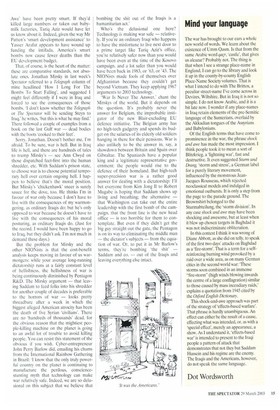Mind your language
The war has brought to our ears a whole new world of words. We learn about the existence of Umm 0asm. Is that from the same Arabic word qacr, 'castle', that gives us alcazar? Probably not. The thing is that when I see a strange place-name in England, I can go to the library and look it up in the county-by-county English Place-Name Society volumes. That is what I intend to do with The Brittox, a peculiar street-name I've come across in Devizes, Wiltshire. But in Iraq it is not so simple. I do not know Arabic, and it is a bit late now. I wonder if any place-names in Iraq retain elements of the pre-Semitic language of the Sumerians, overlaid by the Akkadian tongues of the Assyrians and Babylonians.
Of the English terms that have come to prominence in the war, the phrase shock and awe has made the most impression. I think people took it to mean a sort of Blitzkrieg, a 'lightning war', fast and destructive. It even suggested Sturm und Drang 'storm and stress', a German label for a purely literary movement, influenced by the monstrous JeanJacques Rousseau, which rejected neoclassical models and indulged in emotional outbursts. It is only a step from the page to the parade ground. The Brownshirt belonged to the Sturmabteilung, the 'storm division'. In any case shock and awe may have been shocking and awesome, but at least when it blew up chosen targets in Baghdad it was not indiscriminate obliteration.
In this context I think it was wrong of Diane Abbott, as she did on telly, to speak of the first two days' attacks on Baghdad as a lire-storm'. That is a term for a selfreinforcing burning wind provoked by a raid over a wide area, as on many German cities in the second world war: 'These storms soon combined in an immense "fire-storm" (high winds blowing inwards the centre of a large conflagration) similar to those caused by mass incendiary raids,' explains a quotation from 1945 cited by the Oxford English Dictionary.
This shock-and-awe approach was part of the strategy of 'effects-based warfare'. That phrase is hardly unambiguous. An effect can either be the result of a cause, effecting what was intended, or, as with a 'special effect', merely an appearance, a show. As I understand it, 'effects-based war' is intended to present to the Iraqi people a pattern of attack that demonstrates that not they but Saddam Hussein and his regime are the enemy. The Iraqis and the Americans, however, do not speak the same language.
Dot Wordsworth








































































 Previous page
Previous page